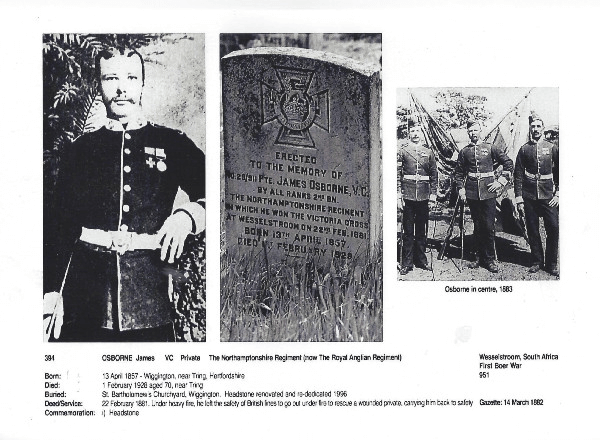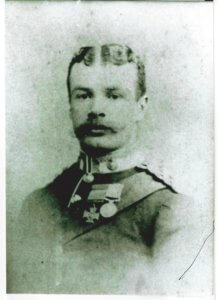James Osborne VC

Who was James Osborne?
Born 13 April 1857 in a small cottage in Wigginton later demolished by Lord Rothschild and replaced with a new Huckvale design in 1912. He was a volunteer soldier before joining the regular army in early 1877 and later that year served as a Private with the Northamptonshire Regiment (58th Foot) until 1883.
In 1878 he left England and fought in Zululand and Natal for two years before serving until 1883 in Natal, Transvaal and South Africa then returned to England and left the army 27 February.
So far nothing exceptional. When he joined, he signs the papers with a cross, when he leaves, he signs his name.
His pay records show he earned an extra penny a day (most of the time) for good conduct. He is never promoted from Private.
He returns to Wigginton where he works as a farm labourer for the First Lord Rothschild until he suffers a stroke in 1913 and dies in 1928. His cottage is called Majuba after the military disaster in the First Boer War when the Boers defeated the British.
Why a VC and military funeral in 1928
Read below the description of daring and bravery. There is no doubt of his raw courage. These words hang in St Bartholomews Church, Wigginton, Hertfordshire, HP23 6DZ:
‘On 22 February 1881 a skirmish commenced through an attempt made by a party of Boers to cut off some natives returning to their Kraals near the town. Captain Saunders seeing the danger sent a party of Volunteers to cover their retreat, but the Boers were reinforced, and Captain Saunders therefore sent a sergeant and fifteen men of the 58th and five mounted men to assist the Volunteers. In the course of the skirmish one party of the enemy retired along a valley and were followed by the mounted infantry. The latter soon discovered that another party of about forty Boers were working their way round the rear. The soldiers mounted their horses and attempted to re-join their comrades, but two of their horses were wounded and another killed. Private Mayes, one of those, dismounted, was also shot in the leg and fell on his face in the long grass. Private Wm. Bennett was pursued by seven or eight Boers, who fired at but missed him. Having his own rifle loaded and one of them coming up and galloping alongside him he fired over-arm and shot him. Another Boer now came up and striking him between the shoulders with his rifle, knocked him off his horse. The Boer then dismounted and deliberately fired at him at fifteen paces, the bullet shattering his leg. He lay hidden in the grass for nearly two hours and would probably have remained longer had not one of the Boers waved a white cloth and planted it by him to mark the spot where he was and show he required help. As soon as the enemy had withdrawn, a stretcher party was sent out to bring him in, but amputation of the leg was necessary, and he died that evening.
On seeing Private Mayes fall, Private James Osborne watched the spot, and seeing Mayes rise, attempt to run but fall again, he determined to go to his help and bring him in. He appealed to a Volunteer to let him have his horse to lead to the assistance of his comrade, but without effect, the Volunteer urging that no one could reach the wounded man under such fire. Osborne therefore rode straight from the cover he was under to the spot where he had seen Mayes fall, between two and three hundred yards in line of some two score Boers. Having come up to Mayes, he managed to drag him up behind him on his horse and, slinging Mayes rifle over his shoulder remarked that ‘the Boers should not even get that’. Meanwhile, the other men had kept up an accurate and rapid fire on the Boers. Both men and the horse escaped, though bullets were striking all round them, one hitting Osborne’s rifle close to where he held it.
 For the gallant deed Private Osborne was awarded the Victoria Cross which was notified in the London Gazette of 14 March 1882 as follows:
For the gallant deed Private Osborne was awarded the Victoria Cross which was notified in the London Gazette of 14 March 1882 as follows:
‘James Osborne, for his gallant conduct at Wakkerstroom on 22 February 1881, in riding under heavy fire towards a party of forty-two Boers, picking up Private Mayes who was lying wounded and carrying him safely into camp.’
This is a brave man doing a brave deed and much publicity was gained for the British army. Five days later the Battle of Majuba Hill (near Volksrust, South Africa) on 27 February 1881 was the final and decisive battle of the First Boer War. It was a resounding victory for the Boers and the battle is considered to have been one of the most humiliating defeats of British arms in history. It forced the British to come to terms with the Boers to end the First Boer War by armistice.
So, we remember the brave. He died on 1 February 1928. Full military honours were given at his funeral at St Bartholomews in Wigginton.
Every year a wreath is laid on his grave as part of the Remembrance Day Service in St Bartholomews Churchyard.
Our thanks to Richard Tregoning and Wigginton History Society for this article.

